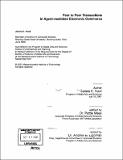| dc.contributor.advisor | Pattie Maes. | en_US |
| dc.contributor.author | Youll, James E. (James Edward), 1964- | en_US |
| dc.contributor.other | Massachusetts Institute of Technology. Dept. of Architecture. Program in Media Arts and Sciences. | en_US |
| dc.date.accessioned | 2005-08-23T18:45:24Z | |
| dc.date.available | 2005-08-23T18:45:24Z | |
| dc.date.copyright | 2001 | en_US |
| dc.date.issued | 2001 | en_US |
| dc.identifier.uri | http://hdl.handle.net/1721.1/8267 | |
| dc.description | Thesis (S.M.)--Massachusetts Institute of Technology, School of Architecture and Planning, Program in Media Arts and Sciences, 2001. | en_US |
| dc.description | Includes bibliographical references (p. 171-176). | en_US |
| dc.description.abstract | This thesis proposes a new approach to electronic markets that overcomes the shortcomings of existing electronic markets through software agent-driven, peer-to-peer, iterative negotiations. Contemporary electronic markets commonly capture both the customs and shortcomings of traditional practice. Rule-based and bound to traditional models, contemporary electronic markets are overly controlling, segregated, inflexible, weakly automated and fixated on price. Many prior attempts to interpose electronic exchanges in existing markets have failed or encountered resistance from traders. Traders' resistance is interpreted here as a call for systems that bend to the will of traders while channeling self-interested actions toward healthy market practices. The Atomic Market is both a model for an agent-based, peer-to-peer marketplace, and a working system that shows the model in operation. The Atomic Market architecture defines a decentralized marketplace wholly controlled by traders through a new protocol for distributed negotiation. The demonstration system is a collection of independent software agents that pursue economic exchanges via the Atomic Market methodology. In the Atomic Market, multiple agents resolve their self-interests though cycles of rewriting a "contract" comprised of descriptive, flexible terms tailored to the needs of each trader. The Atomic Market interprets the Contract Net Protocol as a message-passing system for economic negotiations, in which agents conduct broad, parallel searches to discover opportunities and trading partners in an open marketplace. One of the first implementations of a decentralized, peer-to-peer agent marketplace, the Atomic Market brings together three features not found in contemporary e-commerce systems: decentralization, component-based transactions and open-ended outcomes. Buyers and sellers benefit from the exchange of detailed needs, offers, contingencies and external conditions as they define and negotiate both the substance and terms of a transaction. | en_US |
| dc.description.statementofresponsibility | James E. Youll. | en_US |
| dc.format.extent | 182 p. | en_US |
| dc.format.extent | 13380513 bytes | |
| dc.format.extent | 13380270 bytes | |
| dc.format.mimetype | application/pdf | |
| dc.format.mimetype | application/pdf | |
| dc.language.iso | eng | en_US |
| dc.publisher | Massachusetts Institute of Technology | en_US |
| dc.rights | M.I.T. theses are protected by copyright. They may be viewed from this source for any purpose, but reproduction or distribution in any format is prohibited without written permission. See provided URL for inquiries about permission. | en_US |
| dc.rights.uri | http://dspace.mit.edu/handle/1721.1/7582 | |
| dc.subject | Architecture. Program in Media Arts and Sciences. | en_US |
| dc.title | Peer to peer transactions in agent-mediated electronic commerce | en_US |
| dc.title.alternative | P2P transactions in agent-mediated electronic commerce | en_US |
| dc.type | Thesis | en_US |
| dc.description.degree | S.M. | en_US |
| dc.contributor.department | Program in Media Arts and Sciences (Massachusetts Institute of Technology) | |
| dc.identifier.oclc | 50396797 | en_US |

